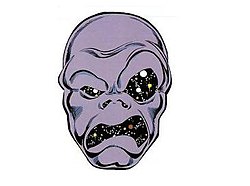Lord Chaos (Marvel Comics)
This article has multiple issues. Please help improve it or discuss these issues on the talk page. (Learn how and when to remove these messages)
|
| Lord Chaos | |
|---|---|
 | |
| Publication information | |
| Publisher | Marvel Comics |
| First appearance | Marvel Two-in-One Annual #2 (1977) |
| Created by | Jim Starlin (writer / artist) |
| In-story information | |
| Alter ego | Lord Chaos |
| Species | Abstract entity |
| Notable aliases | Chaos |
| Abilities |
|
Lord Chaos is a character appearing in American comic books published by Marvel Comics. Created by Jim Starlin, the character first appeared in Marvel Two-In-One Annual #2 ( 1977).[1] Lord Chaos is an abstract entity.[2][3] It is the cosmic counterpart of Master Order and serves as the embodiment of chaos.[4][5]
Publication history
[edit]This section needs expansion. You can help by adding to it. (June 2014) |
The character debuted in Marvel Two-In-One Annual #2 (1977),[6] created by Jim Starlin.[7] It appeared in the 2016 Ultimates 2 series.[8]
Fictional character biography
[edit]Lord Chaos is an abstract entity who embodies disarray and confusion, and the opposing force to "brother" entity Master Order.[9] The pair are rarely seen, but appear to manipulate events to prompt Spider-Man to solicit the Thing to join the Avengers and Adam Warlock in the first war against the Titan Thanos and defeat him.[10]
Lord Chaos and Master Order were then seen observing King of the Norse Gods Odin and master villain Dormammu play a cosmic game of chess.[11] They next conspired with other metaphysical and "omnipotent" beings against the Beyonder.[12] They were then summoned by the Silver Surfer to regain control over their servant the In-Betweener.[13] Lord Chaos and Master Order imprisoned the In-Betweener for his transgressions.[14]
They also attend the funeral of Eon and speak with cosmic hero Quasar.[15]
Lord Chaos and Master Order participated in the congress of metaphysical and abstract beings to determine Thanos' fitness to wield the Infinity Gauntlet. They chose to join Adam Warlock and the other cosmic deities in a bid to stop Thanos.[16] With the other abstract beings, they battled Thanos,[17] and then battled Nebula when she obtained the Gauntlet from Thanos.[18] The congress of abstract beings then witnessed Adam Warlock's cosmic trial to determine his worthiness to wield the Infinity Gauntlet.[19] Lord Chaos and Master Order were next seen among a group of abstract beings questioning the Beyonder from the Dimension of Manifestations.[20]
In Infinity Crusade it is learned that they must obey the dictates of Eternity and Infinity.[volume & issue needed]
In Time Runs Out, the Beyonders kill Chaos, Order, the In-Betweener, and other abstract entities in each reality across the multiverse.[21]
Following the restoration of the universe in Secret Wars, Chaos and Order become disgruntled by Galactus' evolution from a force of destruction to a force of creation. They kill the Living Tribunal and force the In-Betweener to fuse them into Logos, a new being who can take his place. However, they are separated by Black Panther's astral form.[22][23][24]
Powers and abilities
[edit]Lord Chaos is an abstract being who embodies the metaphysical concept of Chaos. It has no physical form, although on occasion it has manifested as a disembodied human head. It has the ability to control and manipulate time, reality, and space.[25]
Thanos wielding the Infinity Gauntlet ranked Lord Chaos' scale of power as above that of Galactus, but below Eternity.[26] Lord Chaos and Master Order were able to easily kill the Living Tribunal by blasting him with energy, and also defeat Galactus after transforming into Logos.[27]
Other versions
[edit]Lord Chaos and Master Order battle Thanos in an alternate universe when he possesses the Heart of the Universe.[28]
References
[edit]- ^ Barnhardt, Adam (October 31, 2018). "Who Could Be the Greater Threat Than Thanos in 'Avengers 4?'". ComicBook.com. Retrieved September 1, 2023.
- ^ Roberson, Chris Chan (August 12, 2022). "15 Marvel Characters Who Could Defeat The Celestials". Comic Book Resources. Retrieved September 1, 2023.
- ^ Brayson, Johnny (September 30, 2022). "The 50 Most Powerful Characters In The Marvel Universe, Ranked". Bustle. Retrieved September 2, 2023.
- ^ Stevens, Tim (December 29, 2016). "A Brief History of Order and Chaos". Marvel.com. Retrieved September 1, 2023.
- ^ Dunphey, Charles (July 8, 2020). "Ranking The 19 Most Powerful Marvel Cosmic Characters". Comic Book Resources. Retrieved September 1, 2023.
- ^ Cacciatore, Francesco (August 20, 2022). "Spider-Man Has Three Different Origins, & They're All Canon". Screen Rant. Retrieved September 1, 2023.
- ^ DeFalco, Tom; Sanderson, Peter; Brevoort, Tom; Teitelbaum, Michael; Wallace, Daniel; Darling, Andrew; Forbeck, Matt; Cowsill, Alan; Bray, Adam (2019). The Marvel Encyclopedia. DK Publishing. p. 218. ISBN 978-1-4654-7890-0.
- ^ Lovett, Jamie (December 27, 2016). "Marvel Kills One Of Its Most Powerful Characters". ComicBook.com. Retrieved September 1, 2023.
- ^ Iacobucci, Jordan (July 16, 2022). "Eternity And 9 Other Crucial Cosmic Entities In Marvel Comics". Screen Rant. Retrieved September 1, 2023.
- ^ Marvel Two-in-One Annual #2 (1977)
- ^ Thor Annual #9 (1981)
- ^ Secret Wars II #6
- ^ Silver Surfer vol. 3 #17 (Nov. 1988)
- ^ Silver Surfer vol. 3 #18 (Dec. 1988)
- ^ Quasar #26 (Sept. 1991)
- ^ Infinity Gauntlet #3 (Sept. 1991)
- ^ Infinity Gauntlet #4-5 (Oct.-Nov. 1991)
- ^ Infinity Gauntlet #6 (Dec. 1991)
- ^ Warlock and The Infinity Watch #1 (Feb. 1991)
- ^ Quasar #38 (Sept. 1992)
- ^ New Avengers vol. 3 #30 (April 2015)
- ^ The Ultimates vol. 2 #6
- ^ The Ultimates 2 vol. 2 #2
- ^ The Ultimates 2 vol. 2 #3
- ^ Karbank, Octavio (November 16, 2017). "15 Evil Marvel Gods Too Frightening For The MCU". Comic Book Resources. Retrieved September 1, 2023.
- ^ Thanos Annual #1 (2014)
- ^ The Ultimates 2 #2
- ^ Marvel: The End #1-6 (2003)
External links
[edit]- Lord Chaos at Marvel.com
